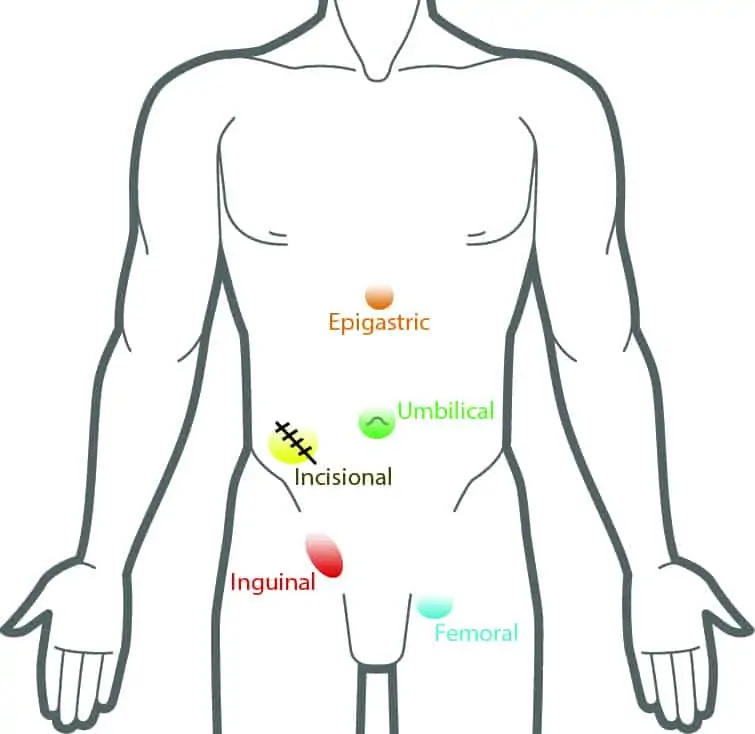The term hernia means any protrusion of abdominal contents through a weakened area in a person’s abdominal wall. Hernias can occur in many locations around the body. The most common kinds of hernia occur in the groin, with 27% of men and 3% of women developing one in their lifetime.
Many hernias are asymptomatic, and some people don’t even realise they have a hernia. The most common symptoms of hernias include:
- A bulge that may or may not be able to be pushed back inside the abdomen
- A bulge that gets bigger on coughing or straining
- Pain or ache
- Intestinal obstruction
Most hernias are described by their location. The most common ones include:

Inguinal hernia
Inguinal hernias occur in the groin. They are the most common hernia in both men and women, comprising two-thirds (66%) of all hernias. They are much more common in men. They cause a bulge in the groin which in males, can extend all the way down into the scrotum. They can contain fat and occasionally, small or large bowel can also extend into the hernia from the inside. It is not uncommon to have groin hernias on both sides.
Umbilical hernia
Hernias that occur under or around the belly-button (umbilicus) are also very common, making up 15% of all hernias. These can also contain fat or bowel.
Femoral hernia
These hernias are also found in the groin. They account for 2% of all hernias. Femoral hernias are slightly more prone to getting bowel caught in them, and as such prompt repair is usually recommended.
Incisional hernia
These occur through previous surgical incisions in the abdominal wall. They account for about 10% of hernias.
There are many other less common hernias that Dr Lancashire also treats.
What are the risk factors for developing a hernia?
There are reasons why some people are more prone to hernias than other people:
- Having a previous hernia repair
- Increasing age
- Raised pressure in the abdominal cavity (e.g. pregnancy, obesity)
- Long term straining (e.g. chronic cough, chronic constipation, prostate problems)
- Organ dysfunction / failure (e.g. liver or kidney failure)
- Heavy lifting
Why fix a hernia?
Hernias get bigger over time. Unfortunately, you cannot do specific exercises to make your hernia smaller. In fact, hernias can be worsened by strenuous exercise and straining. A smaller hernia is easier to fix than a large one.
The biggest risk associated with having a hernia is if a loop of bowel gets caught in it. This may cause the bowel to become blocked (bowel obstruction), or the blood supply to the bowel may get cut off, creating a life-threatening situation.
Most hernias can be fixed with minimal risks. Hernia repair is also more successful if it is done electively, rather than in an emergency. Unless you have medical problems that make surgery risky, most surgeons would recommend having your hernia repaired sooner rather than later.
Surgery for hernias
Over 75,000 hernia repairs are done in Australia every year. Sometimes surgeons will place mesh at the time of the hernia repair. Mesh is prosthetic material used to strengthen the hernia repair. It is safe, and the concept has been used in some shape or form for over a century.
Hernia surgery can be performed as either open surgery or laparoscopic (keyhole) surgery. Not all hernias are suitable for keyhole surgery.
Dr Lancashire is a specialist hernia surgeon. He performs a wide range of hernia repairs, both open and keyhole (laparoscopic). He will be able to guide you through your hernia surgery options and help you decide which procedure is best for you.


